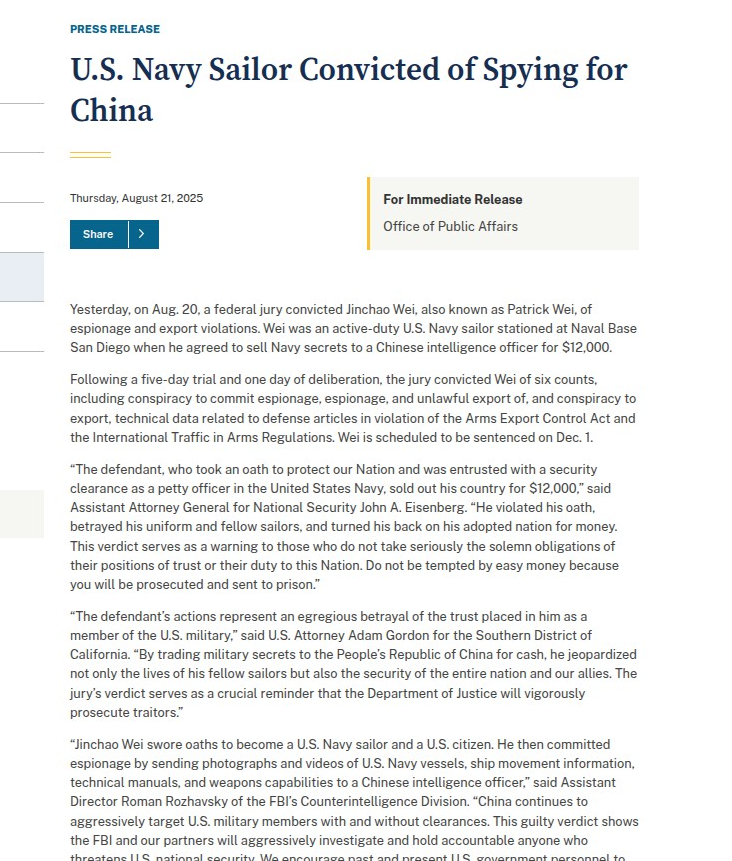Navy Sailor Convicted of Espionage: A Window into China's Military Intelligence Operations

U.S. Navy machinist's mate sold military secrets to Chinese intelligence for $12,000, highlighting persistent threats to American national security
In a case that underscores the ongoing espionage threat posed by China to U.S. military operations, a federal jury in San Diego convicted Navy sailor Jinchao Wei of espionage on August 20, 2025, following a five-day trial. The conviction represents a significant milestone in federal counterintelligence efforts and offers a stark reminder of the sophisticated methods employed by Chinese intelligence services to penetrate American military ranks.

The Conviction and Charges
Jinchao Wei, also known as Patrick Wei, was convicted of six counts, including conspiracy to commit espionage, espionage, and unlawful export of, and conspiracy to export, technical data related to defense articles in violation of the Arms Export Control Act and the International Traffic in Arms Regulations. Wei is scheduled to be sentenced on Dec. 1.


The 25-year-old Chinese-born naturalized U.S. citizen was an active-duty U.S. Navy sailor stationed at Naval Base San Diego when he agreed to sell Navy secrets to a Chinese intelligence officer for $12,000. Serving as a machinist's mate aboard the amphibious assault ship USS Essex, Wei held a security clearance that provided him access to sensitive information about the vessel's weapons, propulsion, and desalination systems.
Significantly, the jury acquitted Wei of one count of naturalization fraud, focusing the conviction specifically on his espionage activities rather than his citizenship status.
The Recruitment and Operation
The case reveals sophisticated intelligence tradecraft employed by Chinese operatives to recruit and develop assets within the U.S. military. Wei was approached in February 2022 via social media by someone who claimed to be a naval enthusiast. The individual was in reality a Chinese intelligence officer.

What makes this case particularly concerning is that Wei quickly recognized the true nature of his contact. On February 22, 2022, Wei told a friend who was also in the U.S. Navy that he thought he was "on the radar of a China intelligence organization," as he was in contact with an individual who was "extremely suspicious," "interested in the maintenance cycle of naval ships," and wanted him to "walk the pier" to "see which ships are docked" on a "daily basis." Wei said that this person would pay him $500. Wei told his friend that he is "no idiot" and that "this is quite obviously fucking espionage."
Despite this clear understanding of the illegal nature of his activities, Wei proceeded with the arrangement, utilizing encrypted apps and other methods and used a new computer and phone provided by his handler, whom he referred to as "Big Brother Andy."
Information Compromised
Over the 18-month period from February 2022 to his arrest in August 2023, Wei provided extensive intelligence to his Chinese handler. The attorney's office said Jinchao Wei gave the intelligence officer about 60 technical and operating manuals about Navy ships and dozens of photographs.
He also sent detailed information about other U.S. Navy ships that he took from restricted U.S. Navy computer systems. In exchange for this information, the intelligence officer paid Wei more than $12,000 over 18 months.
The intelligence Wei provided included:
- Technical manuals for Navy ships marked with export-control warnings
- Photographs and videos of the USS Essex
- Information about ship locations and movements at Naval Base San Diego
- Details about weapons systems, propulsion, and defensive capabilities
- Operational information that could reveal tactical vulnerabilities


Evidence of Deliberate Intent
The prosecution presented compelling evidence that Wei was fully aware of the wrongfulness of his actions. The government told the jury that the evidence showed Wei was aware that what he was doing was wrong. He had received recent training from the Navy regarding how to detect recruitment efforts from foreign governments; he attempted to conceal his activity; and he searched the internet about another case in which a U.S. Navy sailor was convicted of espionage, even reading a Department of Justice press release about that case.
This evidence directly contradicted defense arguments that Wei was naive or unaware of the implications of his actions. Upon his arrest, Wei admitted guilt, acknowledging that his decision to provide secrets to China was espionage and patently wrong. "I'm screwed," he told FBI agents during an interview after he was taken into custody.
Defense Arguments and Prosecution Response
Wei's defense attorney, Sean Jones, argued that while his client's actions were wrong, Wei "never intended to harm the United States." Jones described Wei as "young and naive and regrettably agreed to share some very low level information in exchange for easy money."
However, prosecutors painted a different picture. During closing arguments Tuesday, a prosecutor from the U.S. Department of Justice's National Security Division told the jury that Wei, who was assigned to the San Diego-based amphibious assault ship USS Essex, had been motivated by greed and selfishness rather than political ideology. "This is not a case about the defendant hating the United States or his allegiance to the Chinese Communist Party," Assistant U.S. Attorney Adam Barry told the jurors. "Jinchao Wei's allegiance was to Jinchao Wei. Jinchao Wei was loyal to Jinchao Wei."

Broader Context: China's Military Intelligence Campaign
The Wei case is part of a broader pattern of Chinese intelligence operations targeting U.S. military personnel. "China continues to aggressively target U.S. military members with and without clearances," said Assistant Director Roman Rozhavsky of the FBI's Counterintelligence Division.
Recent cases demonstrate the persistence and scope of these efforts:
- Parallel Cases: Around the same time as Wei's arrest, another Navy sailor, Wenheng Zhao, was also arrested for selling sensitive military information to Chinese intelligence. Wenheng Zhao, who pleaded guilty to conspiring with a Chinese intelligence officer and receiving a bribe, was sentenced early last year to more than two years in prison.
- Active Recruitment Networks: In June 2025, two Chinese nationals spied on Navy sailors and bases for China's intelligence agency and attempted to recruit service members as assets. Yuance Chen, 38, and Liren "Ryan" Lai, 39, appeared in federal court June 30 to face charges issued by the Northern District of California regarding illegal clandestine activities on behalf of the Ministry of State Security, China's primary intelligence agency.

Strategic Implications
According to counterintelligence experts, the incidents of Chinese espionage far outnumber those by any other country, even Russia. The long-term cost to the American economy and national security cannot be precisely measured, but estimates run into the billions of dollars for commercial and technological espionage.
The targeting of naval personnel appears particularly strategic. "The PRC [People's Republic of China] government seeks blue-water naval capabilities as part of their effort to modernize their navy and establish hegemony in the South China Sea," the affidavit reads. "Blue-water capabilities" generally refer to long-distance maritime efforts, as opposed to operations based closer to domestic shores. "As such, the PRC government tasks and deploys the MSS to surreptitiously target the US Navy and collect intelligence."

Government Response and Warning
Officials used the conviction to send a clear message about consequences for betraying national security. "The defendant, who took an oath to protect our Nation and was entrusted with a security clearance as a petty officer in the United States Navy, sold out his country for $12,000," said Assistant Attorney General for National Security John A. Eisenberg. "He violated his oath, betrayed his uniform and fellow sailors, and turned his back on his adopted nation for money."
The case also serves as a warning to both current and former government personnel. "We encourage past and present U.S. government personnel to beware of anyone offering to pay for their information or opinions and to report any suspicious contacts to the FBI," said FBI Assistant Director Roman Rozhavsky.
Legal Significance
The conviction under the federal espionage statute is relatively rare and significant. Randy Grossman, the U.S. attorney for the Southern District of California, said at Thursday's press conference that to his knowledge the espionage charge Wei is facing has never been brought in the district and has only been charged five times in the last six years across the U.S.
Wei faces a potential sentence of 20 years to life in prison when he appears for sentencing on December 1, 2025.

Lessons for National Security
The Wei case highlights several critical vulnerabilities and lessons:
- Social Media Recruitment: Chinese intelligence operatives are successfully using social media platforms to identify and approach potential assets
- Financial Motivation: Even relatively small amounts of money can compromise individuals with access to sensitive information
- Recognition vs. Action: Even when individuals recognize they are being recruited for espionage, financial incentives may still prove effective
- Ongoing Threat: The systematic nature of Chinese recruitment efforts requires constant vigilance and improved counterintelligence training

As the U.S. continues to face an increasingly complex national security environment, the conviction of Jinchao Wei serves as both a successful example of counterintelligence work and a sobering reminder of the persistent threats facing America's military forces. The case underscores the critical importance of robust security protocols, comprehensive training, and the need for service members to remain vigilant against foreign recruitment attempts, regardless of how benign they may initially appear.














